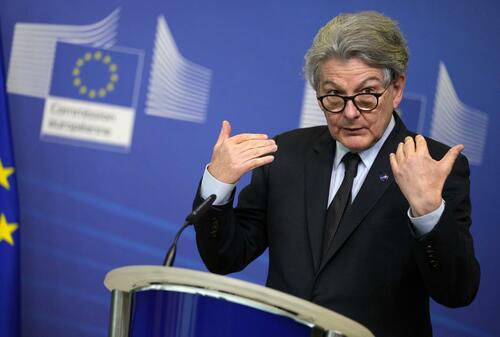Left-Wing EU Commissioner Warns Musk, “The Bird Will Fly By Our Rules”
Musk reportedly has plans to reduce moderation, but such plans may come into conflict with incoming EU laws concerning so-called hate speech.
Among the various challenges Elon Musk faces as the new owner of Twitter, one of his biggest might be the European Union, especially if he moves forward with many of his promised efforts to restore free speech on the platform.
And as John Cody reports for Remix News, after Musk tweeted that “the bird is free!” following his purchase of Twitter, EU Commissioner Thierry Breton warned him, writing, “In Europe, the bird will fly by our [European Union] rules.”
In Europe, the bird will fly by our 🇪🇺 rules.#DSA https://t.co/95W3qzYsal
— Thierry Breton (@ThierryBreton) October 28, 2022
Breton simply wrote “DSA,” referring to the EU’s Digital Service Act, which is a broad act, but one of the fundamental elements of the act is designed to regulate and restrict speech on the web under the guise of “combating hate speech.” In essence, the DSA gives the EU broad powers to censor political dissidents and political speech it deems a threat to the power of the left-liberal establishment.
“The Digital Services Act and Digital Markets Act aim to create a safer digital space where the fundamental rights of users are protected and to establish a level playing field for businesses,” reads the act’s description on the European Commission website.
The European Council outlines how the DSA will operate in principle, writing: “The DSA follows the principle that what is illegal offline must also be illegal online. It aims to protect the digital space against the spread of illegal content, and to ensure the protection of users’ fundamental rights.”
“The obligations introduced are proportionate to the nature of the services concerned and tailored to the number of users, meaning that very large online platforms (VLOPs) and very large online search engines (VLOSEs) will be subject to more stringent requirements. Services with more than 45 million monthly active users in the European Union will fall into the category of very large online platforms and very large search engines.”
Musk reportedly has plans to reduce moderation, but such plans may come into conflict with the DSA, which demands platforms partake in what is likely to be aggressive content moderation.
The law is not yet in force, but it is expected to radically restrict free speech in Europe.
“The DSA will be directly applicable across the EU and will apply fifteen months or from 1 January 2024, whichever comes later, after entry into force. As regards the obligations for very large online platforms and very large online search engines, the DSA will apply from an earlier date, that is four months after their designation,” reads the site.
It is unclear what will constitute “hate speech” or “disinformation” or who will be the arbiter of these designations, but for example, the vast majority of fact-checkers working for Facebook in Central and Eastern Europe are funded by billionaire oligarch George Soros, whose money has flowed through nearly every major left-liberal NGO and establishment figure in the West, which means those opposed to mass immigration, restrictions on freedom of speech, or supporters for traditional family values, may find themselves designated as purveyors of “hate speech” and subject to fines or censorship under the DSA.
On top of the DSA, Musk undoubtedly features numerous challenges ahead, including a potential flight of advertisers who may boycott his platform, as well as app restrictions from the Google Play and Apple Store unless Musk regulates the platform according to the standards dictated by the rival tech companies. In addition, Musk could also face threats from many different directions, including, for example, hosts cutting off cloud support, such as what happened to Parler shortly after the 2020 elections. Banks could also cut off payment processing and U.S. regulators may also be able to fine and harass his platform.
The reality is that Twitter already features plenty of speech that could fall under the category of “hate speech,” by the EU’s vague definition of the word.
The European Council outlines how the DSA will operate in principle, writing:
“The DSA follows the principle that what is illegal offline must also be illegal online. It aims to protect the digital space against the spread of illegal content, and to ensure the protection of users’ fundamental rights.”
A number of organizations that are backed by billionaire oligarch George Soros and his Open Society Foundation are on the list of “stakeholders” for DSA, including Avaaz and Amnesty International. Thierry Breton is also a stakeholder, along with top tech firms such as Google, IBM, Facebook, and Twitter, along with activist NGOs like HateAid.
Tyler Durden
Mon, 10/31/2022 – 02:45

